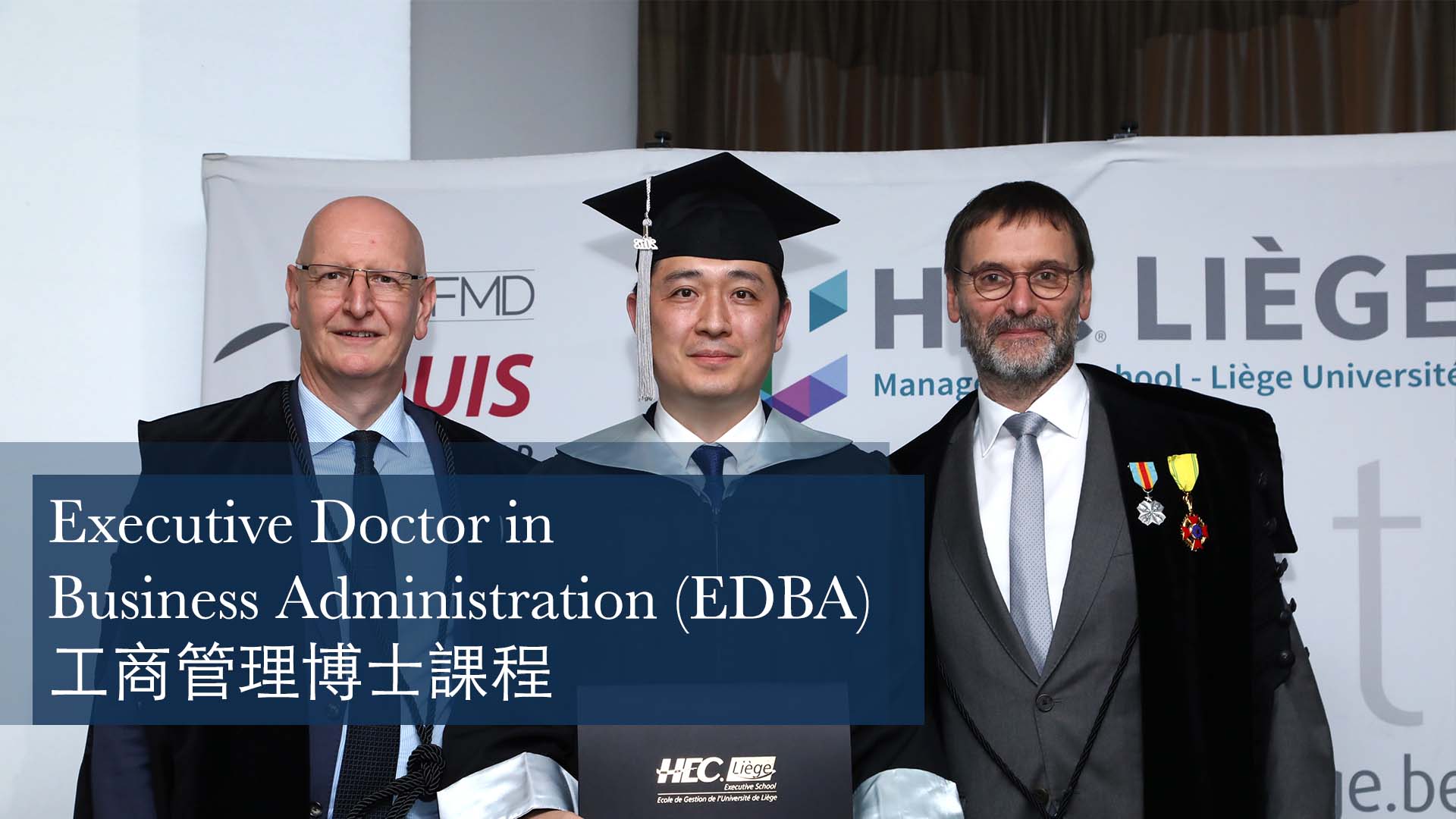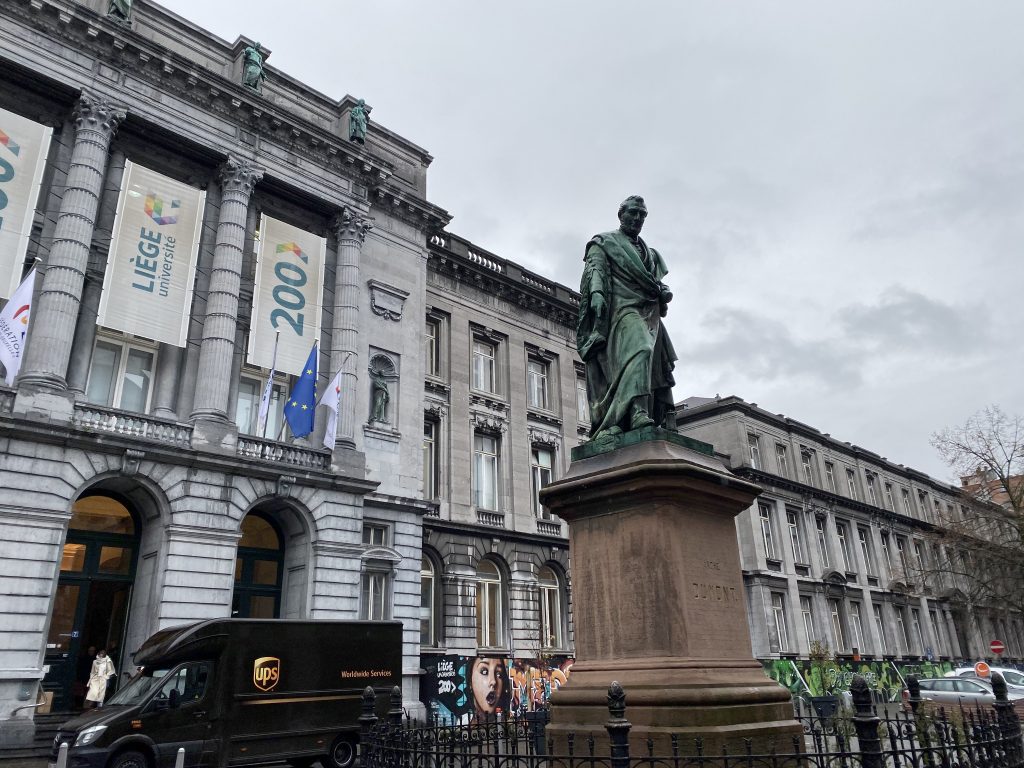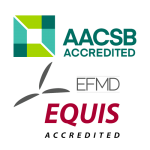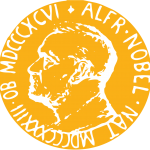

Earn a Top European Executive DBA degree
in Three Years
The Executive DBA offered by HEC Liege Executive Education, Management School of the University of Liege, Belgium is a part-time doctoral program designed for senior professionals to advance their learning whilst working in their existing roles. Gain advanced knowledge of critical business issues and establish yourself as an influential leader.
The University of Liège


The University of Liège (ULiège), in Liège, Wallonia, Belgium, is a major public university in the French Community of Belgium. The University of Liège (ULiège), in Liège, Wallonia, Belgium, is a major public university in the French Community of Belgium. As of 2022, ULiège was ranked in the #351-400 category worldwide according to Times Higher Education, 480th by QS World University Rankings, and between the 301st and 400th place by the Academic Ranking of World Universities. More than 2000 people, academics, scientists, and technicians are involved in research of a wide variety of subjects in both basic and applied research.

Founded in 1817 with 18,000 alumni worldwide, The University of Liège is the first Belgian university to hold the European ECTS and Diploma Supplement labels.

Accredited by both AACSB and EQUIS. Ranked #480 worldwide by QS in 2022. The first Belgian business school to be doubly accredited AACSB and EQUIS. Less than 1% of business schools in the world receive such an honor.

Albert Claude, a professor of The University of Liège, was a Belgian medical doctor who won the Nobel Prize in Physiology/Medicine in 1974.
About the EDBA Program

The EDBA is a practical combination of strong academic content, coupled with advanced business strategies and solutions.

Flexible learning mode that combines online learning, research seminars, and oral defense conducted by the HEC Liege faculty and the Dean of the business school.

Supported by the university professors and a strong faculty team, made up of skilled educators, researchers, and experienced industry practitioners.

Three years completion time with flexible assessment, a high graduation rate, and also providing an excellent networking platform with executives from Greater China.
The Executive Doctorate in Business Administration is the most advanced non-academic business degree. The EDBA is a practical combination of strong academic content, coupled with advanced business strategies and solutions. The EDBA is ideal for individuals on a high corporate level who wish to acquire an extensive academic and industry related exposure. You will be actively involved in academic research, socio–economic ideas and business interests.
• apply relevant theoretical knowledge to contemporary business problems;
• critique contemporary organizational practice in the light of relevant theory;
• explain the principles of, and apply, a range of quantitative and qualitative research methods frequently used in business research;
• determine and apply appropriate research methods to business management problems;
• critically evaluate business research studies in order to assess their quality and applicability in improving the effective handling of business management problems;
• acquire and utilize knowledge of behavioral, policy and strategic issues to improve the effectiveness of their own organizations;
• identify, analyze and evaluate internal and external environmental influences on organizations in order to develop strategic plans for the management of change and development;
• demonstrate superior oral and written communications skills relevant to business; and
• link the educational experience directly with their own workplace experience.
| No. | Course Code | Course | Credits |
|---|---|---|---|
| YEAR 1 | |||
| THE FOUNDATION FOR RESEARCH | |||
| 1 | EDBA601 | Research Methodology I | 4 |
| 2 | EDBA602 | Project Management | 5 |
| 3 | EDBA603 | Management of Organisations | 5 |
| 4 | EDBA604 | Research Conference I | 4 |
| YEAR 2 | |||
| THE BUILDING OF ARESEARCH PROJECT | |||
| 5 | EDBA605 | Research Methodology II | 4 |
| 6 | EDBA606 | Agile Methodology for Project Managers | 5 |
| 7 | EDBA607 | Financial Economy | 5 |
| 8 | EDBA608 | Research Conference II | 4 |
| YEAR 3 | |||
| THE IMPLEMENTATION | |||
| 9 | EDBA609 | Dissertation | 20 |
| 10 | EDBA610 | Research Conference III | 4 |
| TOTAL: | 60 | ||
EDBA601: Research Methodology I
The Research Methods course is divided in two parts, which will provide participants with a solid foundation and valid frameworks to accomplish their research goals.
Synopsis
The first part of the course examines two methods of approaching research, namely qualitative research and behavioral research. Topics covered include the criteria for valid and reliable research, the advantages and disadvantages of different research strategies, electronic and paper tools for searching literature, research methods – observational, survey, experimental, general writing techniques, writing style, data analysis, and data presentation.
This course introduces students to the field of research. It examines in depth the research process and introduces doctoral candidates to the various aspects of doing scientific research, providing practical advice and insight in the field. Topics covered include hypothesis formulation and theory construction, data collection techniques, ethical issues in research, and research design.
This is a very practical course aimed to guide participants through the work that lies ahead.
Learning Objectives / Outcomes
At the end of this course students will be able to:
•distinguish amongst the different types of research;
•be aware of the tools used and their relative roles and reliability; and
•to review the steps to be undertaken in the research design, writing, and the steps in publishing the results.
EDBA602: Project Management
Synopsis
How can your organization, culture and governance sustain Effective Project Management. The environment in which a project evolves and the constraints it generates on the project can have a significant impact on its objectives, sometimes more than the risks inherent to the project.
It is important for a project manager to be able to understand these constraints, but it is even more important for a company managing project portfolios to ensure that its organization, its governance rules and its cultural context favor effective project management.
Learning Objectives & Outcomes
The objective of this course is to study organizational and governance impacts on project management by covering the following topics:
•Different types of organizations and respective impact on project management;
•How to interface project’s world with organization’s world? OBS (Organization
•Breakdown Structure) – RBS (Resource Breakdown Structure) – RACI Matrix);
•Expected role of a Project Manager and a PMO;
•Key elements of project and portfolio governance;
•Impact of organization’s culture on project management: Cultural Change Model.
Theoretical notions will be illustrated through a case study focusing on “Sonaca’s way to increase its projects maturity”.
EDBA603: Management of Organizations
Synopsis
The course is designed to help students analyze and understand how modern organizations are structured and work in practice. The following variables are examined: organizational structure, processes and workflows, division and coordination of work between operators along key processes, departmentalization, liaison mechanisms between units, decision-making processes, authority and power relations, power games, institutional goals and objectives, formal and informal communication flows, contextual influences on organizational choices, organizational configurations, etc.
Constructed mainly according to an analytical logic, the course aims to make students aware of the diversity of contemporary organizations and the importance of taking managerial actions that correspond to the specific reality of each institution, whether private companies or public bodies.
Learning Objectives & Outcomes
The objectives of the course are:
•theoretical (introducing the major debates and contemporary issues in organizational theory);
•analytical (development of students’ ability to carry out complete and detailed organizational diagnoses);
•normative (raising the students’ awareness of the importance of taking managerial actions that correspond to the specific reality of each organization).
EDBA604: Research Conference I
Synopsis
- The core component of EDBA conferences is the presentation of new research in the form of papers and/or presentations.
- It is common for there to be major presentations by “keynote” or “plenary” speakers who are respected experts at the top of their game in the field or discipline. These sessions are designed to draw an audience from the entirety of
conference attendees.- Often these talks are longer than the rest of the presentations,
- Keynote speakers often present on the major theme or themes of the
conference.
- Smaller presentations, usually with more specified topics of discussion and smaller audiences, offer other researchers the chance to present and test their discoveries and insights.
- These sessions often take place concurrently with other presentations
- It is common for there to be major presentations by “keynote” or “plenary” speakers who are respected experts at the top of their game in the field or discipline. These sessions are designed to draw an audience from the entirety of
- Presentations at conferences are often followed by questions and discussion between presenters and their audience.
- Commonly, either a selection of the papers or all the papers of a conference will be edited and published as “Conference Proceedings” subsequent to the conference.
EDBA605: Research Methodology II
Synopsis
The second part of the course will examine the fields of quantitative and econometric research. Topics covered include scientific methods, cognitive guidelines, quantification and standardization in survey research, reconciling practical and scientific requirements for creating valid and unbiased surveys.
Part two will examine research tools and applied econometrics, regression analysis, estimation procedures, hypothesis testing, time series modeling, and forecasting.
Additional emphasis will be put on the process of rigorous formation of research questions and research design.
Learning Objectives & Outcomes
At the end of this course the student will be able to:
- distinguish between the different methods of collecting, analyzing data and the research techniques to be used for optimum results;
- examine a wide range of concepts and methods for observing, interviewing, recording and analyzing field data shall be covered;
- manipulate quantitative and qualitative methods or research;
- examine and demonstrate the ethical considerations in qualitative research practice; and
gain solid understanding of statistical tools used in empirical analysis and will allow the participants to develop solid analytical skills.
EDBA606: Agile Methodologies for Project Managers
Synopsis
Fostering creativity to boost innovation through Design Thinking and Lean startup methodologies.This program is designed for professionals who want to build their capabilities to innovate, and for managers who want to help their organization become agile, transforming it into a vehicle of innovation
Learning Objectives & Outcomes
This program is for those who believe that innovation is not just about launching new products or services. It’s is about executing an idea which addresses a specific challenge and achieve value for both the company and the customer. Participants will discover Why and How Agile methodologies can be used to innovate and address the challenges of our fast changing century. They will be introduced to the theory of Disruptive Innovation developed by Prof. Clayton Christensen (Harvard Business School) and how Agile tools can be used to innovate and develop the next growth engines.
EDBA607: Financial Economy
Synopsis
The course in Monetary and Financial Economics covers monetary theory and policy (Prof. Lionel Artige) as well as the management of financial institutions (Prof. Danielle Sougné). The program consists of 2 parts:
Part 1 (Lionel Artige): Monetary economics
- Money and the money market
- The demand for money
- The money supply: money creation
- Interest rate
- formation Monetary policy
- Financial crises
Part 2: The Foreign Exchange Market (Danielle Sougné)
- Introduction to the Foreign Exchange Market
- The different exchange rate regimes
- Determination of exchange rates
- Cryptocurrency
Learning Objectives & Outcomes
The objective of this course is to acquire knowledge in economics and finance in order to understand the working of the financial markets.
EDBA608: Research Conference II
Synopsis
A conference is a gathering of researchers and/or professionals in a given field wherein scholars present their ideas and engage in discussion and critical interaction with other experts and peers.
- The core component of EDBA conferences is the presentation of new research in the form of papers and/or presentations.
- It is common for there to be major presentations by “keynote” or “plenary”speakers who are respected experts at the top of their game in the field or discipline. These sessions are designed to draw an audience from the entirety of
conference attendees.- Often these talks are longer than the rest of the presentations,
- Keynote speakers often present on the major theme or themes of the
conference.
- Smaller presentations, usually with more specified topics of discussion and smaller audiences, offer other researchers the chance to present and test their discoveries and insights.
- These sessions often take place concurrently with other presentations
- It is common for there to be major presentations by “keynote” or “plenary”speakers who are respected experts at the top of their game in the field or discipline. These sessions are designed to draw an audience from the entirety of
- Presentations at conferences are often followed by questions and discussion between presenters and their audience.
- Commonly, either a selection of the papers or all the papers of a conference will be edited and published as “Conference Proceedings” subsequent to the conference.
EDBA609: Dissertation
Synopsis
An original, academic written product of the systematic study of a significant problem that follows a coherent methodology, independent research and comprehensive thinking. An appropriate organisation and documentation is part of it. A supervisor (typically a local faculty member) accompanies and discusses the student’s work, closely checks the progress and takes on academic responsibility.
Learning Objectives & Outcomes
At the end of this course the student will be able to:
- to critically analyze in depth a research topic of interest related to the modules of the EDBA program in the field of business and/or management;
- demonstrate a profound understanding of the theoretical concepts and frameworks in relevant literature that supports and forms the basis of the main arguments and hypotheses of their dissertation;
- demonstrate the ability to approach the dissertation arguments from a wider context and to be able to provide unambiguous and convincing evidence to justify and sustain such arguments to its conclusion; and
- learn and grow by deepening their self and social awareness in their multiple roles as a business researcher and leader.
EDBA610: Research Conference III
Synopsis
A conference is a gathering of researchers and/or professionals in a given field wherein scholars present their ideas and engage in discussion and critical interaction with other experts and peers.
- The core component of EDBA conferences is the presentation of new research in the form of papers and/or presentations.
- It is common for there to be major presentations by “keynote” or “plenary” speakers who are respected experts at the top of their game in the field or discipline. These sessions are designed to draw an audience from the entirety of
conference attendees.- Often these talks are longer than the rest of the presentations,
- Keynote speakers often present on the major theme or themes of the
conference.
- Smaller presentations, usually with more specified topics of discussion and smaller audiences, offer other researchers the chance to present and test their discoveries and insights.
- These sessions often take place concurrently with other presentation
- It is common for there to be major presentations by “keynote” or “plenary” speakers who are respected experts at the top of their game in the field or discipline. These sessions are designed to draw an audience from the entirety of
- Presentations at conferences are often followed by questions and discussion between presenters and their audience.
- Commonly, either a selection of the papers or all the papers of a conference will be edited and published as “Conference Proceedings” subsequent to the conference.
HEC Liège Executive Education welcomes qualified applicants with no discrimination towards their gender, age, cultural, ethnic, religious and racial backgrounds. Distance learning candidates are admitted on a continuous basis. (i.e. continuous enrolment).
Admission at HEC Liège sets minimum criteria which have been designed to identify applicants who have sound academic potential and who show creativity, critical thinking, social and moral values, evidence of English language proficiency and strong motivation.
Successful applicants must fulfill the following criteria:
Working experience of 10 years.
Behaviour skills and motivation.
Previous degree: Postgraduate Diploma, MBA, Master or HEC Liège Executive School EMBA.
Join the DBA Discussion Group

Hong Kong Graduate School of Advanced Studies (GSAS) is a nonprofit institution aimed at training talented graduates to excel at the intersection of advanced technology and industry application. GSAS' predecessor has worked with the world's leading universities (Harvard, MIT, Stanford) in delivering executive programs for the past twenty years. To prepare students with sought-after technical AI expertise in the finance and business industries, GSAS' strategy is to utilize the latest content developed by the best universities and corporations, and to deliver them with first-class industry-experienced professors.

